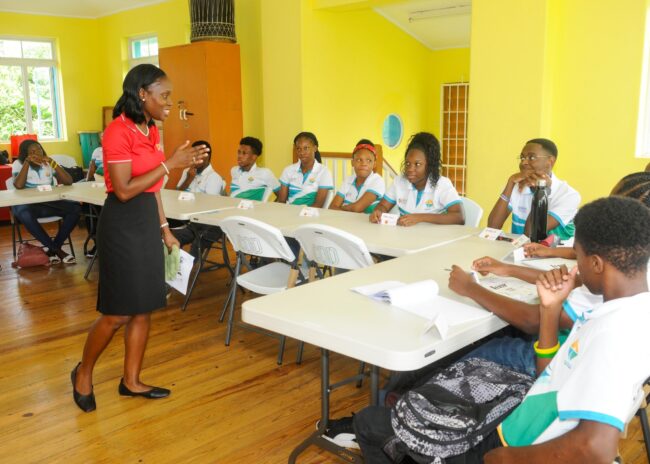Hone Your Soft Skills for Success: Insights from CIBC FirstCaribbean's Talent Acquisition Manager

August 31, 2023
Gain insights from human resource experts on developing soft skills and effective communication to improve job applications, interviews, and interpersonal relationships for success in the workplace.
“Intelligence will take you so far but to be successful, it is important to hone your soft skills; be an effective communicator”.
That was one of the takeaways that Stephanie Blackman, Talent Acquisition & Development Manager at CIBC FirstCaribbean, left with the 21 young people who participated in the Pathways – Employability Camp put on by the Ministry of Youth, Sports and Community Empowerment.
Blackman, who led two interactive sessions at the two-week camp at the Harold Nurse Resource Centre, Friendship, Hothersal Turning, St Michael, which ended on August 25, focused on communication and interpersonal skills as well as job applications and interviews.
Immediately before the start of Blackman’s sessions, Senior Youth Commissioner, Elizabeth Bowen urged the campers to take advantage of the opportunity to gain insights from the experts in the human resource field, by participating, which included asking questions and making comments.
Bowen also thanked CIBC FirstCaribbean and its officials for the prompt and encouraging response that the Ministry’s Youth Affairs Division received when it asked the bank to be its partner with the camp.
Blackman then illustrated to the campers how effective communication was critical in developing relationships and building trust. Using examples, she pointed out the path they could use to become effective communicators.
This route, the human resources practitioner told the campers included practising listening actively rather than having a running dialogue in their heads or being otherwise distracted that they missed the essence of what was being said. The bank official reconnected with this point later during her second session that looked at job interviews when she noted that some interviewees failed to answer questions appropriately due to poor listening which seemed to result from being distracted by their thoughts or by being eager to say something they had prepared.
Blackman also noted that listening and responding with empathy was important, since by putting themselves in other people’s shoes, they would be able to give effective and caring feedback and respond to people properly regardless of the person’s social or cultural background.
Being aware of their non-verbal communication is another point she stressed. The talent acquisition manager told them this type of communication often said more than verbal communication and that during job interviews, in the workplace, at home and in life generally, body language, posture, facial expression and how you touch others tell a lot about how you feel and whether it complements what you are saying.
As she urged them to hone their communication skills, she listed the benefits such as helping to solve and prevent conflict, improving decision-making, building interpersonal relationships and helping to open doors of opportunity.
These opportunities include those available during the job hunt. As Blackman spoke about writing resumes, and preparing for and attending interviews, she explained how non-verbal communication can help or hinder an applicant’s progress.
She warned against submitting unprofessional email addresses and photos on job applications since these bits of information send signals to the recruiter about the applicant’s character and thought processes. Write and speak with clarity, make honest statements and customise your resume and cover letters to match the requirements for the job, she said.
Blackman also encouraged the campers to apply for jobs in which they had an interest even if they did not have all the qualifications or skills outlined in the vacancy notice. She explained that unless a job was tailor-made for someone, they would hardly have 100 per cent of the requirements.
The specialised camp targeted young people who are preparing to enter the job market or to start tertiary education. (PR)


